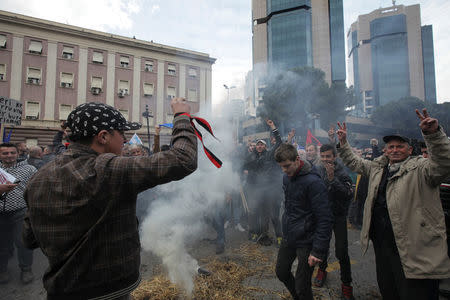Albanian opposition to boycott parliament, defying EU appeal
By Benet Koleka TIRANA (Reuters) - Albania's opposition leader announced a boycott of parliament on Wednesday, defying an appeal from the European Union not to disrupt parliamentary approval of judiciary reforms vital to starting EU accession talks. Several thousand members of the Democratic Party and its lawmakers have camped out since Saturday in an 800 square metre tent in front of Prime Minister Edi Rama's office, demanding a technocrat government to set the stage for free elections. "The protest will not be rolled back. We shall not return to parliament unless the conditions the people have asked ... are met; a technocrat government for free and fair elections," the Democrats's leader Lulzim Basha told the crowd. Albanians will vote in parliamentary elections on June 18, four years after Rama's leftist coalition ousted the Democrats. The ruling coalition has since won all local elections, but the Democrats have complained they were cheated out of victory and are pressing for reforms to guarantee fair elections. The opposition boycott of parliament will effectively stall the creation of bodies that would vet 750 judges and prosecutors, a stepping stone to creating an independent and clean judiciary able to fight endemic corruption. Rama said the Democrats called for free elections to hide their real intention of defending corrupt justice officials. Should the judiciary reform produce results by September, the EU has told Albania it would consider starting accession talks with the NATO member and former communist state. The standard of its June parliamentary elections will also matter, the EU has said. Expressing his regret for the boycott, EU Enlargement Commissioner Johannes Hahn said: "The political debate should not take place outside, but inside the parliament." "In particular, it is of utmost importance to maintain parliamentary continuity in a time where substantial reforms are on the agenda of the parliament," Hahn said in a statement. As well as setting up vetting bodies for the judiciary, the reforms include implementing recommendations from the Organisation for Security and Cooperation in Europe (OSCE) in order to ensure "free and fair elections later this year". "These reforms are crucial for Albania to move forward on its EU integration path," Hahn added, urging cooperation. Knut Fleckenstein, the European Parliament's rapporteur for Albania, said he was happy to see 140 "heroes" in parliament when they passed the judiciary reform unanimously in July 2016. "I ask them to continue what they believe is right (the protest) but go back to work; now it is time to see if who was in favour of the paperwork will push the reform through," Fleckenstein told a news conference at the EU embassy office. (Reporting By Benet Koleka; Editing by Dominic Evans)

 Yahoo News
Yahoo News 

